US Senator, Experts Urge Military Action To Deter Iran
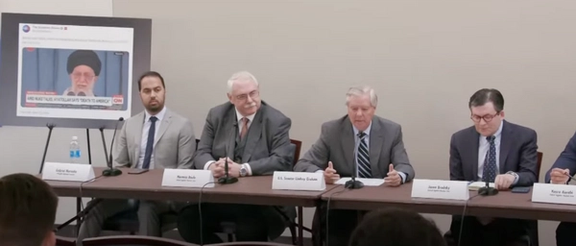
Amid Israel’s war against Iran-backed Hamas, US Senator Lindsey Graham hosted a panel of Iran experts to discuss how the US must take a firm posture to deter Iran.

Amid Israel’s war against Iran-backed Hamas, US Senator Lindsey Graham hosted a panel of Iran experts to discuss how the US must take a firm posture to deter Iran.
Moderated by United Against Nuclear Iran (UANI) CEO Ambassador Mark D. Wallace, the Wednesday “Roundtable on Correcting US Policy Toward Iran” included several fellow analysts at the UANI and former US State Department advisor on Iran Gabriel Noronha.
The participants in the panel were all critics of the Biden administration's foreign policy and particularly its Iran policy.
Senator Graham (R-SC), who this week called for a joint military operation against Iran, blames the Iranian regime for Hamas' attack against Israel October 7 that can potentially lead to a multi-front full-fledged war in the Middle East.
Pointing to the Biden administration's official reaction to the attack claiming there is no evidence proving Tehran’s direct involvement, Graham quipped, “If you believe the Ayatollah in Iran woke up one day and read about this attack in the paper or saw it on TV, you're crazy!” He argued that Washington does not want to confirm Iran’s role because then it will be urged to act about it.
Referring to about 30 US citizens killed in the Hamas attack, which Iran has been celebrating since day one and glorifying as a victory for its so-called ‘axis of resistance,' Graham said the US should make Iran feel that there are consequences for the actions of its proxy militants across the region.
‘Axis of Resistance’ is a term coined by the Islamic Republic to refer to its proxy forces in the region including, Palestinian militant groups, the Syrian regime, the Lebanese militant group Hezbollah and other factions.
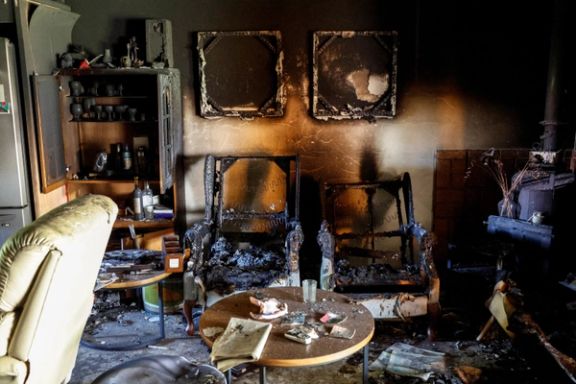
Referring to Jordan, Egypt and Palestinian Authority canceling their meeting with President Joe Biden this week, based on an exaggerated report about an explosion at a Gaza hospital, the Senator argued that US allies should also know there will be consequences for their behavior.
Referring to the possibility of Hezbollah and other Tehran-backed US-designated terror groups joining the conflict, he said that if this war expands, the US should start military action against Tehran. “If there was a war with Iran, we would win," he stated.
Graham urged the United States to stop the Islamic Republic, which seeks to destroy the Jewish state and has been very vocal about it; “Israel cannot afford two holocausts.”
He also said that the timing of the attack – often called on media as “the September 11 of the Middle East”-- is directly related to the news about the normalization of relations between Israel and Saudi Arabia, which Iran was warning against since other Arab countries did so in the Abraham accord. “This attack was so vicious and so cruel that it had a purpose: to make it so gruesome that Israel could not look away and has to go in on the ground, and the belief is that will stop the reconciliation process,” he said.
Emphasizing the threat posed by Iran in case it builds nuclear bombs, Garaham said North Korea, Russia or China have nukes, but they would not attack the US preemptively because they are not “religious zealots.” “The Iranians are motivated by religion. They want chaos to bring back the missing Imam. They want the end of times to unfold in in their lifetime so if they had a nuclear weapon, I am 100% confident they would use it as part of their religious crusade.”
The Biden administration chose to engage in indirect negotiations with Iran upon assuming office in early 2021 to revive the JCPOA nuclear accord abandoned by Donald Trump, but the talks failed and Iran in the meantime expanded its nuclear program. According to the UN nuclear watchdog the IAEA, Iran now has enough enriched uranium for up to 5 nuclear warheads.
Panelist Norman Roule, who served for 34 years in the Central Intelligence Agency (CIA) managing various Middle East programs, started with enumerating the incidents in which Iran’s logistic or intelligence support led to the killing of Americans in the region, such as the Beirut bombing in 1983, as well as Iran’s assassination and abductions attempts on the US soil.
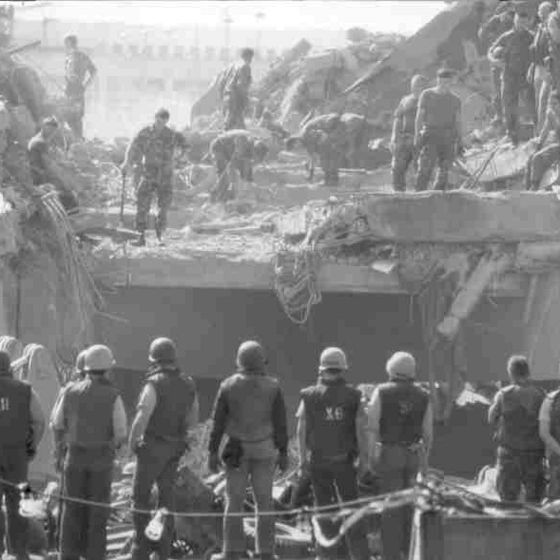
Roule criticized the US sanctions systems on Iranian officials as inconsequential since almost all of the sanctioned individuals would never seek to come to the US or own property there in the first place. He explained that not only such actions are symbolic but also encourage the adversary to say that “this is all they’re going to do.” “From Ukraine to Gaza; from Washington to New York; from Beirut to Yemen and Africa people are dying and will die unless this posture changes.”
Calling on the US as well as its European and Asian allies to confront Iran, Roule said that if the international community is not willing to confront Iran at present, “would they be willing to confront Iran with a nuclear weapon?” “Relentless diplomacy is a brilliant approach but endless diplomacy without deterrence is a gift to Tehran,” he stated.
He also slammed the lax enforcement of oil sanctions that have made Iran built up its foreign currency reserves “that would be very difficult and time consuming to gnaw down under actual serious sanctions.”
Jason Brodsky, the UANI policy director with deep insight into Iranian politics, pointed out that the Biden administration seeks to keep Iran's role in the Hamas attack “undefined” because saying that Iran was directly involved puts public pressure on the administration to do something about it. “It's apparent not only to Americans but to the Iranian regime that he is not keen on doing something about the Iranian problem.”
He noted that unless Iran believes that the US is willing to inflict grievous military losses on it, “the escalation is inevitable.”
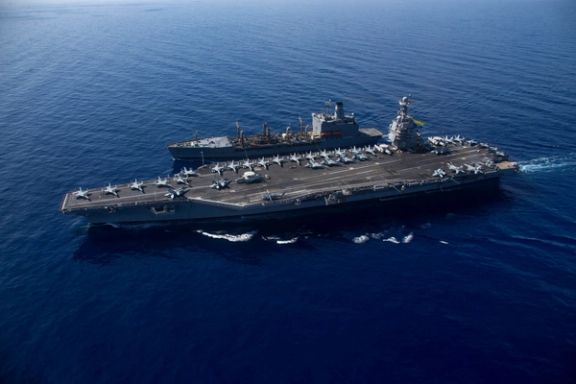
“We can't just create deterrence by issuing a strongly worded press statement, warning of unspecified consequences... we can't restore deterrence with piecemeal sanctions on individuals who have no assets in the United States and are unlikely to travel here,” he said, stating that “there has to be a kinetic element to these policies to change the Iranian perception.”
Kasra Aarabi, a UK-based IRGC specialist, referred to remarks by British officials who labeled Iran’s Revolutionary Guards as the biggest threat on the UK soil, saying that there are mountains of evidence to prove that Revolutionary Guards are active on British soil. He explained how groups linked to Iran’s Supreme Leader are influencing the minds of British Muslim students with antisemitic and extremist ideologies, hosting events with IRGC commanders as speakers who “glorify IRGC terrorism.”
“They called on these students in London to join an apocalyptic Army to ‘end the lives of Jews’ around the world,” he underlined.
Urging the designation of IRGC as a terrorist group to limit their sway, Aarabi said that “despite the IRGC's persistent efforts not only to target British citizens directly but also to nurture homegrown Islamist radicalization and terrorism using methods like ISIS and Al-Qaeda through their centers... the IRGC is still not being proscribed.” “That’s the least Europeans can do.”
He emphasized that targeting IRGC bases in the region and inside Iran is not targeting the Iranian people, but “the very people who terrorize the people of Iran, the very people who killed Mahsa and Nika,” some of the most iconic martyrs of the boldest uprising against the clerical regime, came to be known as the Women, Life, Freedom movement.
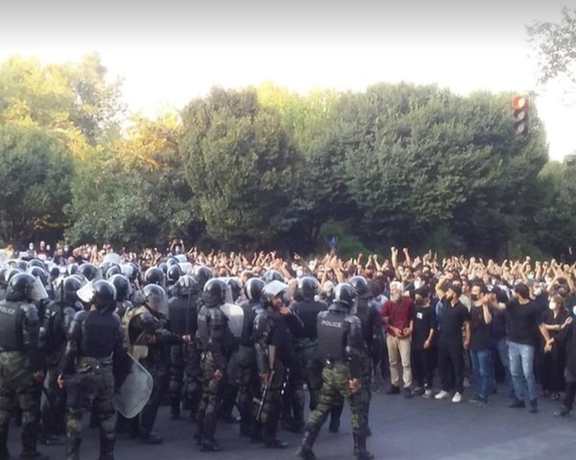
“Iranian people share a common enemy with the Israeli people; the Iranian people stand with the Israeli people because the force that is terrorizing the people of Israel is the same force that is terrorizing the people of Iran,” he argued.
Gabriel Noronha, a former special advisor for the Iran Action Group at the US Department of State, mentioned several incidents that happened exactly as were predicted. He said, Senator Graham warned that if we withdrew from Afghanistan, the Taliban would take over and they did; Senator Graham warned that if we didn't provide weapons to Ukraine and that if we didn't sanction [Russian gas pipeline network] Nord Stream 2, Russia would invade, and they did; Senator Graham is warning now that because we refused to enforce sanctions on Iran, we are headed towards a disaster.”
He said Iran was giving Hamas $100 million a year in 2017 and with the Trump administration's maximum pressure policy on Iran, the Islamist group had to adopt austerity measures, but today “Hamas is getting $350 million from Iran that is 93 percent of its budget.” The Hamas attack on Israel “has been a wakeup call.”
Referring to Iran’s assassination threats against former Secretary of State Mike Pompeo and former National Security Advisor John Bolton as well as the kidnapping attempt against human rights activist Masih Alinejad, Noronha said that “we cannot let the smoking gun be a dead senior American official or human rights dissident.”
Claiming that Iran earns over $150 million a day in oil income, he said the solution is to enforce sanctions to decrease the revenues “as close to zero as we possibly can that will dry up the money for terrorism.” He said when the oil sanctions were being enforced in 2019, Iran’s oil output had dwindled to about 300,000 to 400,000 barrels per day, forcing Iran’s militia groups to lay off fighters because they could not afford to pay them. Now, the regime’s oil exports are estimated to be nearly 2 million barrels.
“We have to tell Iran if you kill Americans, there are consequences. Right now, Iran does not believe there are consequences,” he said, adding, “There have been no missiles from the United States against Hamas; There have been no US missiles against the Iranian installations that fund and train Hamas fighters and there have been no attacks against Iran's oil infrastructure which funds all these attacks.”
“If we continue the status quo, things will get worse,” he noted, calling on Republicans and Democrats to work together and create firm accountability for Iran, which means Congress should authorize the President to take action and that requires Congress to pass laws.
He highlighted that the Iranian people want to overthrow the regime, saying that the US should “put pressure on the regime and the Iranian people will do the rest.”
UANI CEO Wallace said the US has no longer a doctrine of preemption but a doctrine according to which a large number of people should be sacrificed before Washington takes serious actions. “How many rockets must rain down on Israel before we act?” he asked.
“The doctrine of preemption is already over because they've already attacked. This attack by Hamas was already that Iranian attack,” Wallace noted.